Reflection on Palliative Care: Personal Beliefs and Patient Care
VerifiedAdded on 2023/06/13
|7
|2006
|402
Essay
AI Summary
This essay provides a reflective overview of palliative care, emphasizing the importance of a multidisciplinary approach to provide optimal care for patients with life-limiting illnesses. It highlights the significance of holistic care, which includes open communication about prognosis, advanced care planning, psychosocial and spiritual support, and effective pain and symptom management. The reflection focuses on the author's personal beliefs and values, particularly the need to overcome cultural biases and develop cultural competence to provide effective and compassionate care for patients from diverse backgrounds. The essay underscores the importance of respecting patient individuality, obtaining consent, and maintaining effective communication to ensure the best quality of life for patients during their end-of-life journey. Desklib offers a range of resources, including past papers and solved assignments, to support students in understanding and applying these concepts.
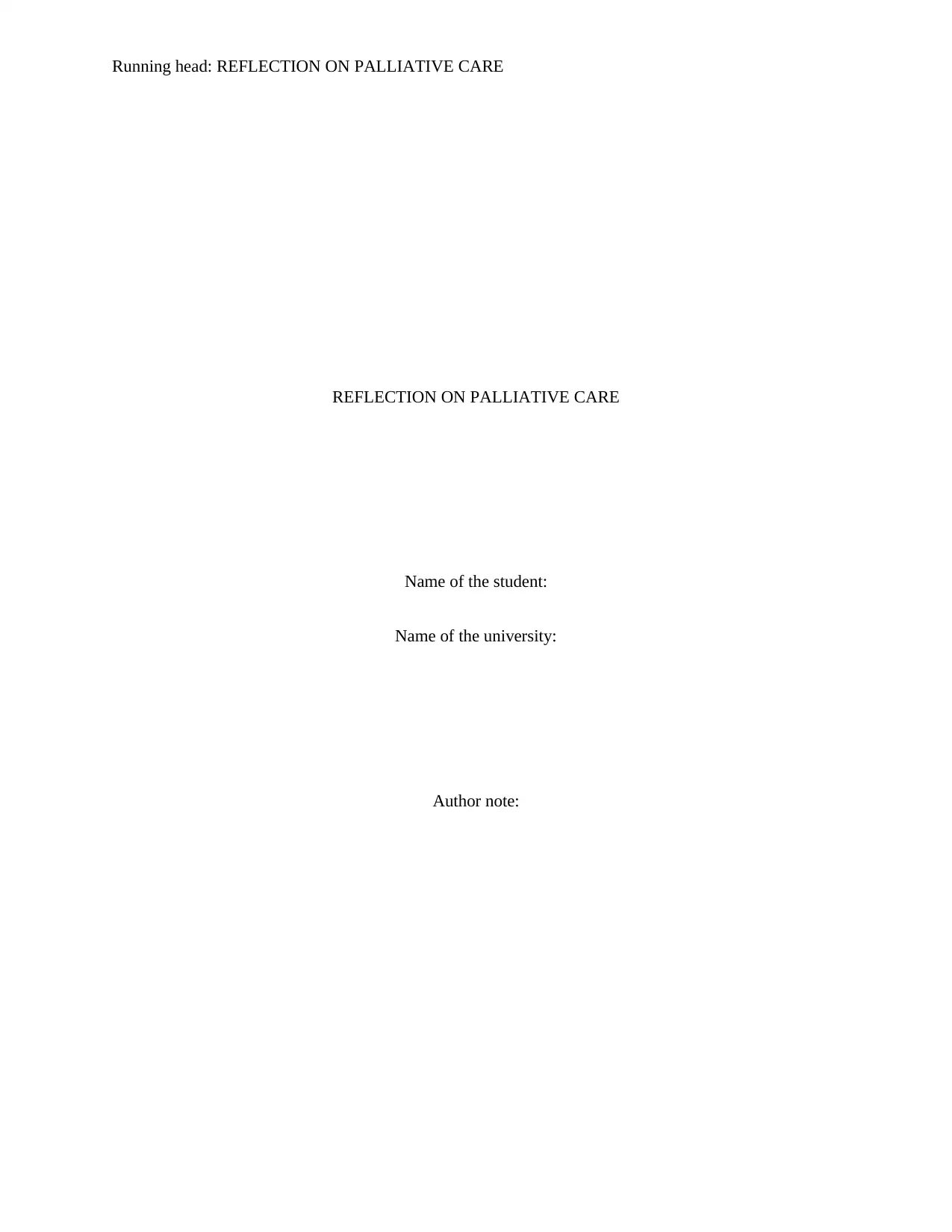
Running head: REFLECTION ON PALLIATIVE CARE
REFLECTION ON PALLIATIVE CARE
Name of the student:
Name of the university:
Author note:
REFLECTION ON PALLIATIVE CARE
Name of the student:
Name of the university:
Author note:
Paraphrase This Document
Need a fresh take? Get an instant paraphrase of this document with our AI Paraphraser
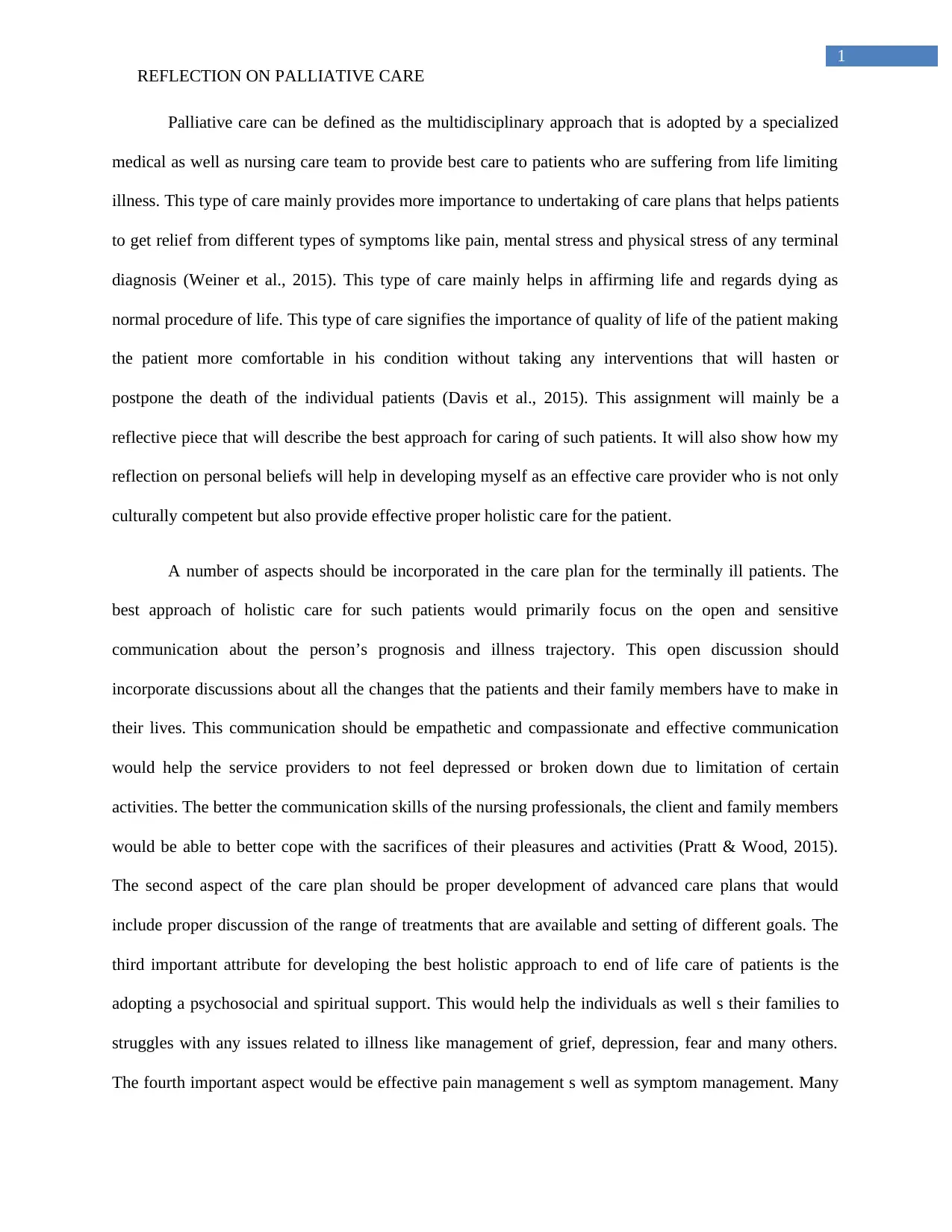
1
REFLECTION ON PALLIATIVE CARE
Palliative care can be defined as the multidisciplinary approach that is adopted by a specialized
medical as well as nursing care team to provide best care to patients who are suffering from life limiting
illness. This type of care mainly provides more importance to undertaking of care plans that helps patients
to get relief from different types of symptoms like pain, mental stress and physical stress of any terminal
diagnosis (Weiner et al., 2015). This type of care mainly helps in affirming life and regards dying as
normal procedure of life. This type of care signifies the importance of quality of life of the patient making
the patient more comfortable in his condition without taking any interventions that will hasten or
postpone the death of the individual patients (Davis et al., 2015). This assignment will mainly be a
reflective piece that will describe the best approach for caring of such patients. It will also show how my
reflection on personal beliefs will help in developing myself as an effective care provider who is not only
culturally competent but also provide effective proper holistic care for the patient.
A number of aspects should be incorporated in the care plan for the terminally ill patients. The
best approach of holistic care for such patients would primarily focus on the open and sensitive
communication about the person’s prognosis and illness trajectory. This open discussion should
incorporate discussions about all the changes that the patients and their family members have to make in
their lives. This communication should be empathetic and compassionate and effective communication
would help the service providers to not feel depressed or broken down due to limitation of certain
activities. The better the communication skills of the nursing professionals, the client and family members
would be able to better cope with the sacrifices of their pleasures and activities (Pratt & Wood, 2015).
The second aspect of the care plan should be proper development of advanced care plans that would
include proper discussion of the range of treatments that are available and setting of different goals. The
third important attribute for developing the best holistic approach to end of life care of patients is the
adopting a psychosocial and spiritual support. This would help the individuals as well s their families to
struggles with any issues related to illness like management of grief, depression, fear and many others.
The fourth important aspect would be effective pain management s well as symptom management. Many
REFLECTION ON PALLIATIVE CARE
Palliative care can be defined as the multidisciplinary approach that is adopted by a specialized
medical as well as nursing care team to provide best care to patients who are suffering from life limiting
illness. This type of care mainly provides more importance to undertaking of care plans that helps patients
to get relief from different types of symptoms like pain, mental stress and physical stress of any terminal
diagnosis (Weiner et al., 2015). This type of care mainly helps in affirming life and regards dying as
normal procedure of life. This type of care signifies the importance of quality of life of the patient making
the patient more comfortable in his condition without taking any interventions that will hasten or
postpone the death of the individual patients (Davis et al., 2015). This assignment will mainly be a
reflective piece that will describe the best approach for caring of such patients. It will also show how my
reflection on personal beliefs will help in developing myself as an effective care provider who is not only
culturally competent but also provide effective proper holistic care for the patient.
A number of aspects should be incorporated in the care plan for the terminally ill patients. The
best approach of holistic care for such patients would primarily focus on the open and sensitive
communication about the person’s prognosis and illness trajectory. This open discussion should
incorporate discussions about all the changes that the patients and their family members have to make in
their lives. This communication should be empathetic and compassionate and effective communication
would help the service providers to not feel depressed or broken down due to limitation of certain
activities. The better the communication skills of the nursing professionals, the client and family members
would be able to better cope with the sacrifices of their pleasures and activities (Pratt & Wood, 2015).
The second aspect of the care plan should be proper development of advanced care plans that would
include proper discussion of the range of treatments that are available and setting of different goals. The
third important attribute for developing the best holistic approach to end of life care of patients is the
adopting a psychosocial and spiritual support. This would help the individuals as well s their families to
struggles with any issues related to illness like management of grief, depression, fear and many others.
The fourth important aspect would be effective pain management s well as symptom management. Many
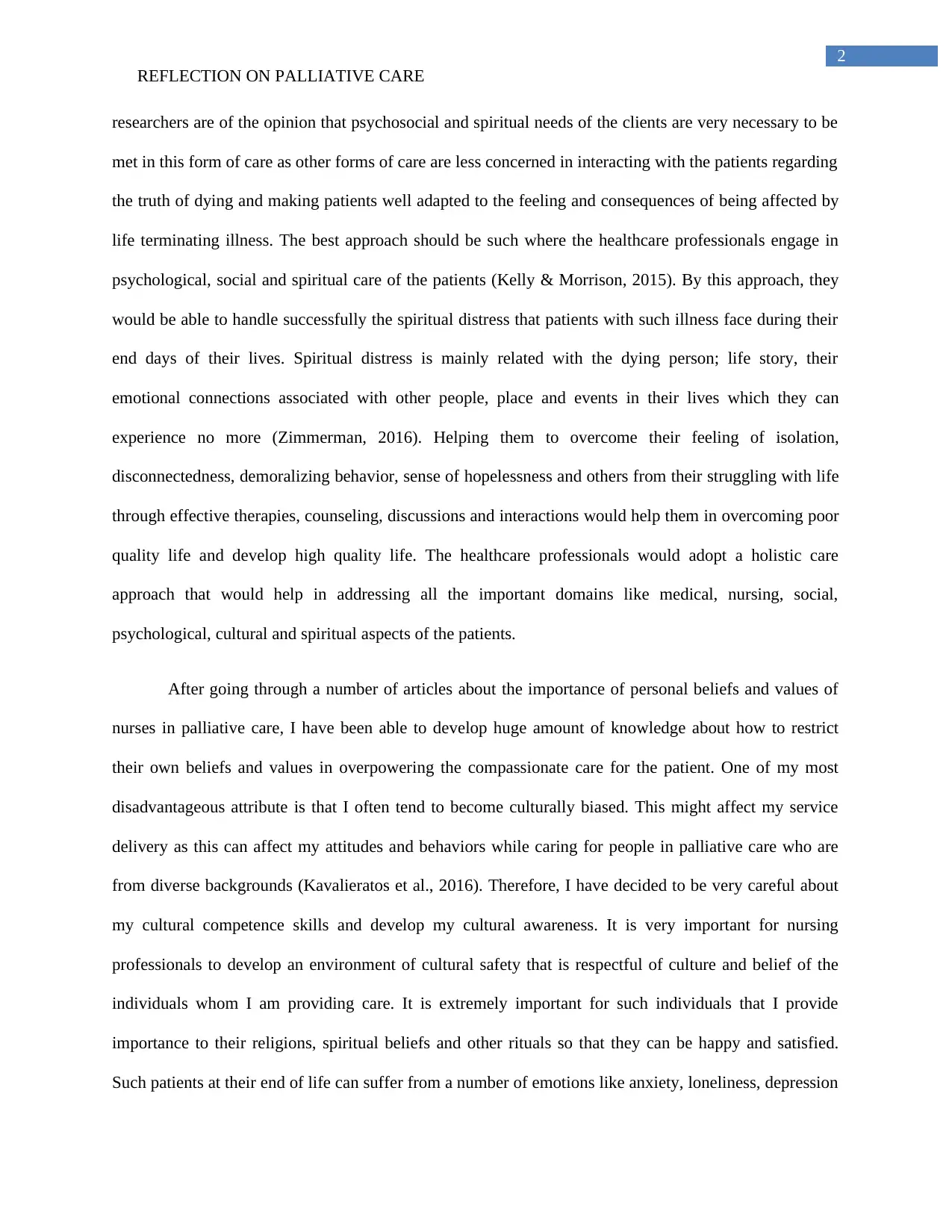
2
REFLECTION ON PALLIATIVE CARE
researchers are of the opinion that psychosocial and spiritual needs of the clients are very necessary to be
met in this form of care as other forms of care are less concerned in interacting with the patients regarding
the truth of dying and making patients well adapted to the feeling and consequences of being affected by
life terminating illness. The best approach should be such where the healthcare professionals engage in
psychological, social and spiritual care of the patients (Kelly & Morrison, 2015). By this approach, they
would be able to handle successfully the spiritual distress that patients with such illness face during their
end days of their lives. Spiritual distress is mainly related with the dying person; life story, their
emotional connections associated with other people, place and events in their lives which they can
experience no more (Zimmerman, 2016). Helping them to overcome their feeling of isolation,
disconnectedness, demoralizing behavior, sense of hopelessness and others from their struggling with life
through effective therapies, counseling, discussions and interactions would help them in overcoming poor
quality life and develop high quality life. The healthcare professionals would adopt a holistic care
approach that would help in addressing all the important domains like medical, nursing, social,
psychological, cultural and spiritual aspects of the patients.
After going through a number of articles about the importance of personal beliefs and values of
nurses in palliative care, I have been able to develop huge amount of knowledge about how to restrict
their own beliefs and values in overpowering the compassionate care for the patient. One of my most
disadvantageous attribute is that I often tend to become culturally biased. This might affect my service
delivery as this can affect my attitudes and behaviors while caring for people in palliative care who are
from diverse backgrounds (Kavalieratos et al., 2016). Therefore, I have decided to be very careful about
my cultural competence skills and develop my cultural awareness. It is very important for nursing
professionals to develop an environment of cultural safety that is respectful of culture and belief of the
individuals whom I am providing care. It is extremely important for such individuals that I provide
importance to their religions, spiritual beliefs and other rituals so that they can be happy and satisfied.
Such patients at their end of life can suffer from a number of emotions like anxiety, loneliness, depression
REFLECTION ON PALLIATIVE CARE
researchers are of the opinion that psychosocial and spiritual needs of the clients are very necessary to be
met in this form of care as other forms of care are less concerned in interacting with the patients regarding
the truth of dying and making patients well adapted to the feeling and consequences of being affected by
life terminating illness. The best approach should be such where the healthcare professionals engage in
psychological, social and spiritual care of the patients (Kelly & Morrison, 2015). By this approach, they
would be able to handle successfully the spiritual distress that patients with such illness face during their
end days of their lives. Spiritual distress is mainly related with the dying person; life story, their
emotional connections associated with other people, place and events in their lives which they can
experience no more (Zimmerman, 2016). Helping them to overcome their feeling of isolation,
disconnectedness, demoralizing behavior, sense of hopelessness and others from their struggling with life
through effective therapies, counseling, discussions and interactions would help them in overcoming poor
quality life and develop high quality life. The healthcare professionals would adopt a holistic care
approach that would help in addressing all the important domains like medical, nursing, social,
psychological, cultural and spiritual aspects of the patients.
After going through a number of articles about the importance of personal beliefs and values of
nurses in palliative care, I have been able to develop huge amount of knowledge about how to restrict
their own beliefs and values in overpowering the compassionate care for the patient. One of my most
disadvantageous attribute is that I often tend to become culturally biased. This might affect my service
delivery as this can affect my attitudes and behaviors while caring for people in palliative care who are
from diverse backgrounds (Kavalieratos et al., 2016). Therefore, I have decided to be very careful about
my cultural competence skills and develop my cultural awareness. It is very important for nursing
professionals to develop an environment of cultural safety that is respectful of culture and belief of the
individuals whom I am providing care. It is extremely important for such individuals that I provide
importance to their religions, spiritual beliefs and other rituals so that they can be happy and satisfied.
Such patients at their end of life can suffer from a number of emotions like anxiety, loneliness, depression
⊘ This is a preview!⊘
Do you want full access?
Subscribe today to unlock all pages.

Trusted by 1+ million students worldwide
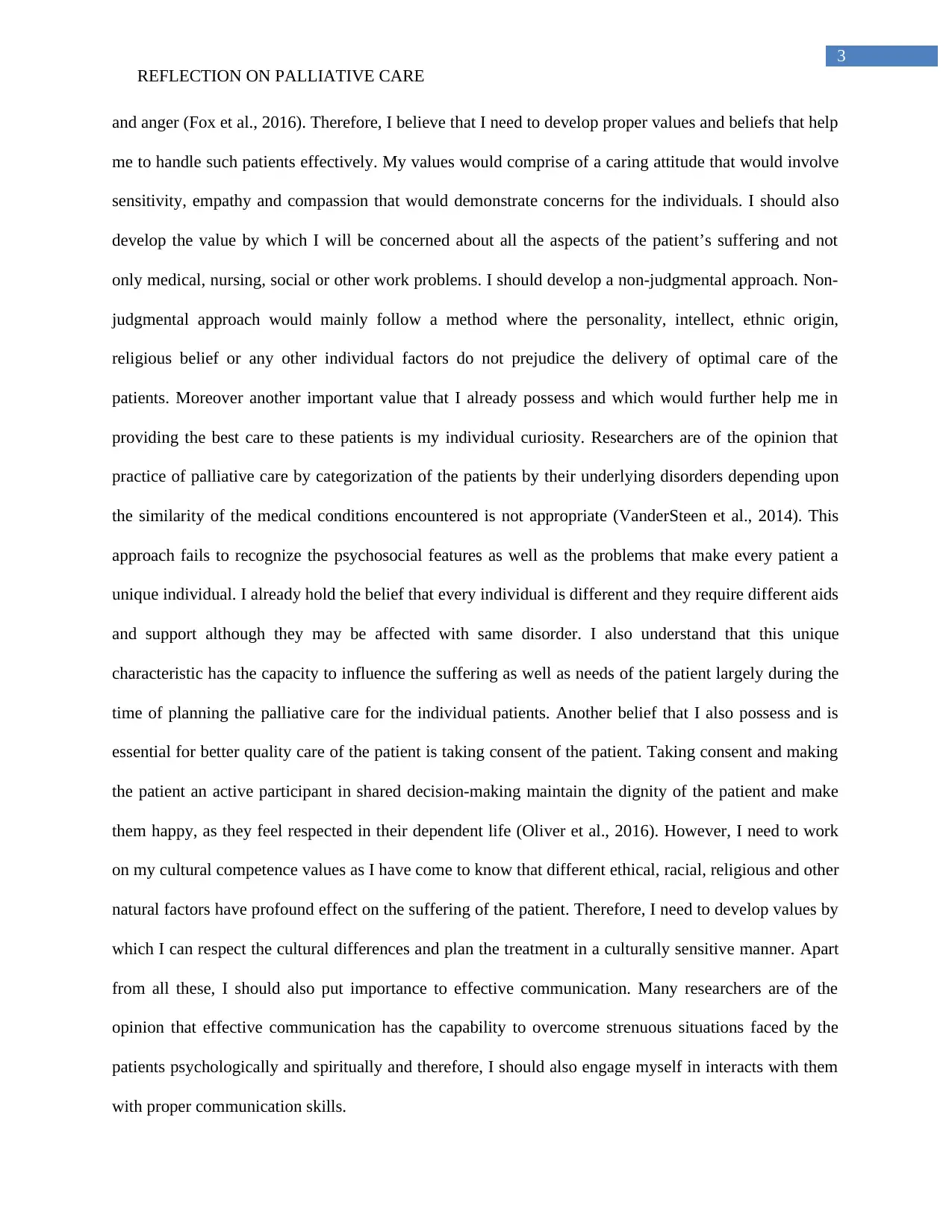
3
REFLECTION ON PALLIATIVE CARE
and anger (Fox et al., 2016). Therefore, I believe that I need to develop proper values and beliefs that help
me to handle such patients effectively. My values would comprise of a caring attitude that would involve
sensitivity, empathy and compassion that would demonstrate concerns for the individuals. I should also
develop the value by which I will be concerned about all the aspects of the patient’s suffering and not
only medical, nursing, social or other work problems. I should develop a non-judgmental approach. Non-
judgmental approach would mainly follow a method where the personality, intellect, ethnic origin,
religious belief or any other individual factors do not prejudice the delivery of optimal care of the
patients. Moreover another important value that I already possess and which would further help me in
providing the best care to these patients is my individual curiosity. Researchers are of the opinion that
practice of palliative care by categorization of the patients by their underlying disorders depending upon
the similarity of the medical conditions encountered is not appropriate (VanderSteen et al., 2014). This
approach fails to recognize the psychosocial features as well as the problems that make every patient a
unique individual. I already hold the belief that every individual is different and they require different aids
and support although they may be affected with same disorder. I also understand that this unique
characteristic has the capacity to influence the suffering as well as needs of the patient largely during the
time of planning the palliative care for the individual patients. Another belief that I also possess and is
essential for better quality care of the patient is taking consent of the patient. Taking consent and making
the patient an active participant in shared decision-making maintain the dignity of the patient and make
them happy, as they feel respected in their dependent life (Oliver et al., 2016). However, I need to work
on my cultural competence values as I have come to know that different ethical, racial, religious and other
natural factors have profound effect on the suffering of the patient. Therefore, I need to develop values by
which I can respect the cultural differences and plan the treatment in a culturally sensitive manner. Apart
from all these, I should also put importance to effective communication. Many researchers are of the
opinion that effective communication has the capability to overcome strenuous situations faced by the
patients psychologically and spiritually and therefore, I should also engage myself in interacts with them
with proper communication skills.
REFLECTION ON PALLIATIVE CARE
and anger (Fox et al., 2016). Therefore, I believe that I need to develop proper values and beliefs that help
me to handle such patients effectively. My values would comprise of a caring attitude that would involve
sensitivity, empathy and compassion that would demonstrate concerns for the individuals. I should also
develop the value by which I will be concerned about all the aspects of the patient’s suffering and not
only medical, nursing, social or other work problems. I should develop a non-judgmental approach. Non-
judgmental approach would mainly follow a method where the personality, intellect, ethnic origin,
religious belief or any other individual factors do not prejudice the delivery of optimal care of the
patients. Moreover another important value that I already possess and which would further help me in
providing the best care to these patients is my individual curiosity. Researchers are of the opinion that
practice of palliative care by categorization of the patients by their underlying disorders depending upon
the similarity of the medical conditions encountered is not appropriate (VanderSteen et al., 2014). This
approach fails to recognize the psychosocial features as well as the problems that make every patient a
unique individual. I already hold the belief that every individual is different and they require different aids
and support although they may be affected with same disorder. I also understand that this unique
characteristic has the capacity to influence the suffering as well as needs of the patient largely during the
time of planning the palliative care for the individual patients. Another belief that I also possess and is
essential for better quality care of the patient is taking consent of the patient. Taking consent and making
the patient an active participant in shared decision-making maintain the dignity of the patient and make
them happy, as they feel respected in their dependent life (Oliver et al., 2016). However, I need to work
on my cultural competence values as I have come to know that different ethical, racial, religious and other
natural factors have profound effect on the suffering of the patient. Therefore, I need to develop values by
which I can respect the cultural differences and plan the treatment in a culturally sensitive manner. Apart
from all these, I should also put importance to effective communication. Many researchers are of the
opinion that effective communication has the capability to overcome strenuous situations faced by the
patients psychologically and spiritually and therefore, I should also engage myself in interacts with them
with proper communication skills.
Paraphrase This Document
Need a fresh take? Get an instant paraphrase of this document with our AI Paraphraser
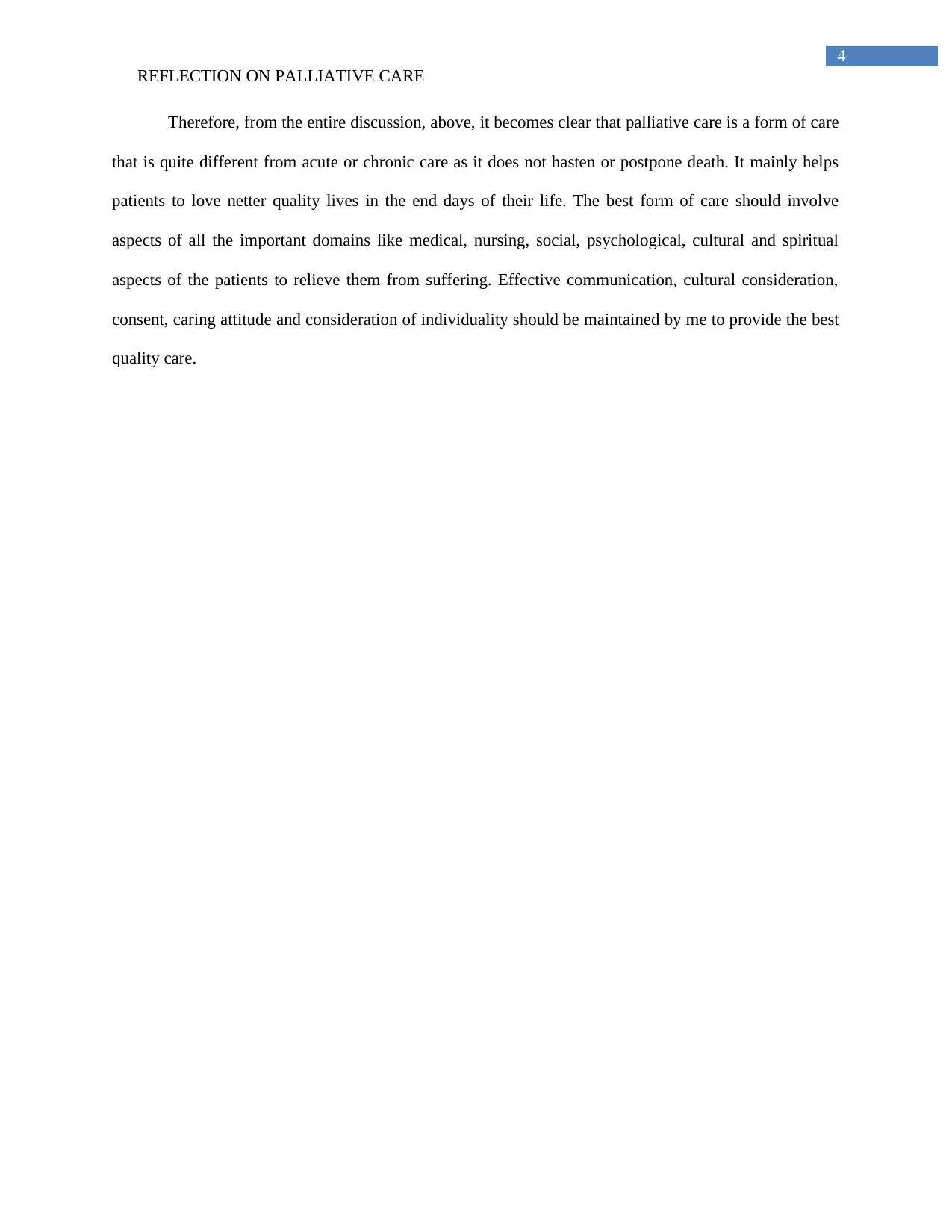
4
REFLECTION ON PALLIATIVE CARE
Therefore, from the entire discussion, above, it becomes clear that palliative care is a form of care
that is quite different from acute or chronic care as it does not hasten or postpone death. It mainly helps
patients to love netter quality lives in the end days of their life. The best form of care should involve
aspects of all the important domains like medical, nursing, social, psychological, cultural and spiritual
aspects of the patients to relieve them from suffering. Effective communication, cultural consideration,
consent, caring attitude and consideration of individuality should be maintained by me to provide the best
quality care.
REFLECTION ON PALLIATIVE CARE
Therefore, from the entire discussion, above, it becomes clear that palliative care is a form of care
that is quite different from acute or chronic care as it does not hasten or postpone death. It mainly helps
patients to love netter quality lives in the end days of their life. The best form of care should involve
aspects of all the important domains like medical, nursing, social, psychological, cultural and spiritual
aspects of the patients to relieve them from suffering. Effective communication, cultural consideration,
consent, caring attitude and consideration of individuality should be maintained by me to provide the best
quality care.
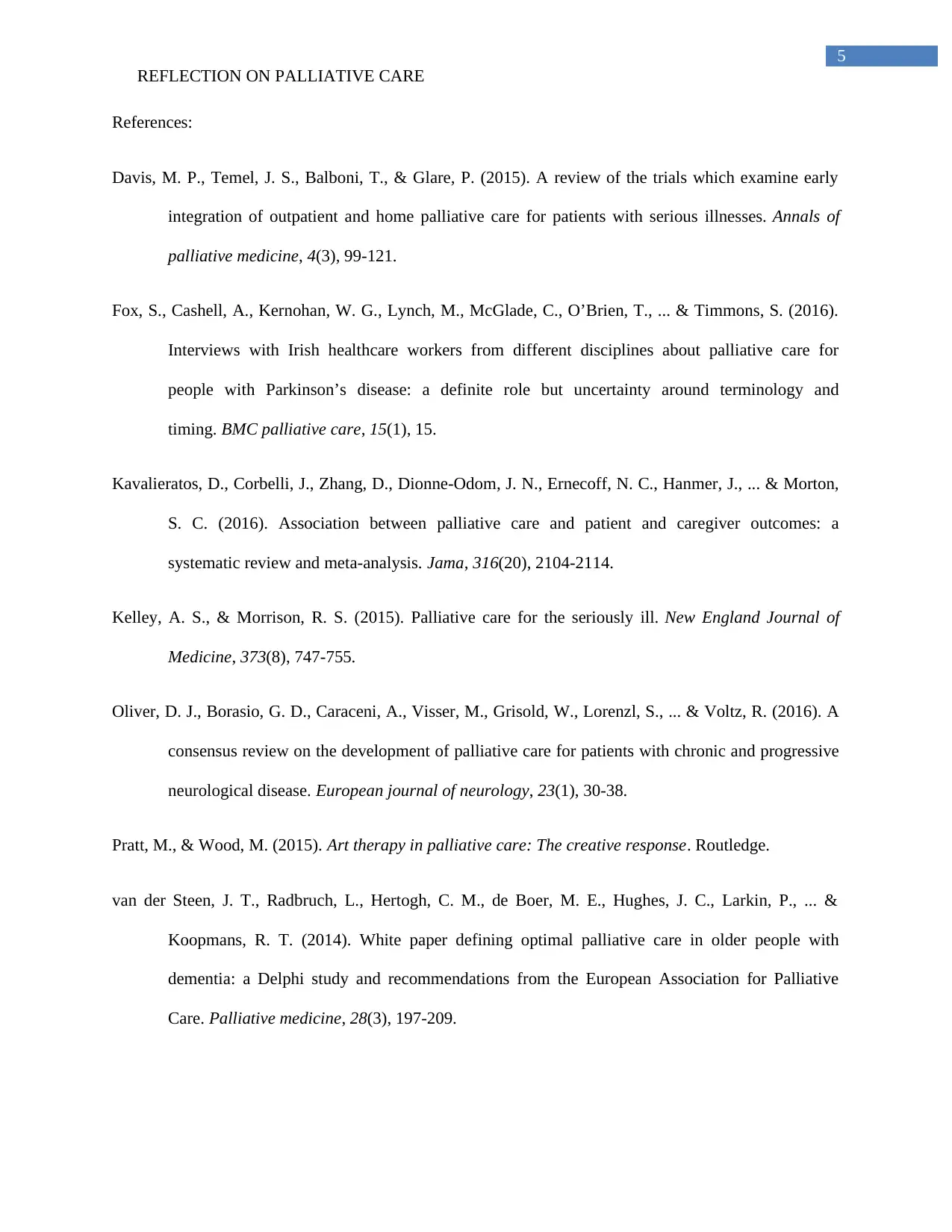
5
REFLECTION ON PALLIATIVE CARE
References:
Davis, M. P., Temel, J. S., Balboni, T., & Glare, P. (2015). A review of the trials which examine early
integration of outpatient and home palliative care for patients with serious illnesses. Annals of
palliative medicine, 4(3), 99-121.
Fox, S., Cashell, A., Kernohan, W. G., Lynch, M., McGlade, C., O’Brien, T., ... & Timmons, S. (2016).
Interviews with Irish healthcare workers from different disciplines about palliative care for
people with Parkinson’s disease: a definite role but uncertainty around terminology and
timing. BMC palliative care, 15(1), 15.
Kavalieratos, D., Corbelli, J., Zhang, D., Dionne-Odom, J. N., Ernecoff, N. C., Hanmer, J., ... & Morton,
S. C. (2016). Association between palliative care and patient and caregiver outcomes: a
systematic review and meta-analysis. Jama, 316(20), 2104-2114.
Kelley, A. S., & Morrison, R. S. (2015). Palliative care for the seriously ill. New England Journal of
Medicine, 373(8), 747-755.
Oliver, D. J., Borasio, G. D., Caraceni, A., Visser, M., Grisold, W., Lorenzl, S., ... & Voltz, R. (2016). A
consensus review on the development of palliative care for patients with chronic and progressive
neurological disease. European journal of neurology, 23(1), 30-38.
Pratt, M., & Wood, M. (2015). Art therapy in palliative care: The creative response. Routledge.
van der Steen, J. T., Radbruch, L., Hertogh, C. M., de Boer, M. E., Hughes, J. C., Larkin, P., ... &
Koopmans, R. T. (2014). White paper defining optimal palliative care in older people with
dementia: a Delphi study and recommendations from the European Association for Palliative
Care. Palliative medicine, 28(3), 197-209.
REFLECTION ON PALLIATIVE CARE
References:
Davis, M. P., Temel, J. S., Balboni, T., & Glare, P. (2015). A review of the trials which examine early
integration of outpatient and home palliative care for patients with serious illnesses. Annals of
palliative medicine, 4(3), 99-121.
Fox, S., Cashell, A., Kernohan, W. G., Lynch, M., McGlade, C., O’Brien, T., ... & Timmons, S. (2016).
Interviews with Irish healthcare workers from different disciplines about palliative care for
people with Parkinson’s disease: a definite role but uncertainty around terminology and
timing. BMC palliative care, 15(1), 15.
Kavalieratos, D., Corbelli, J., Zhang, D., Dionne-Odom, J. N., Ernecoff, N. C., Hanmer, J., ... & Morton,
S. C. (2016). Association between palliative care and patient and caregiver outcomes: a
systematic review and meta-analysis. Jama, 316(20), 2104-2114.
Kelley, A. S., & Morrison, R. S. (2015). Palliative care for the seriously ill. New England Journal of
Medicine, 373(8), 747-755.
Oliver, D. J., Borasio, G. D., Caraceni, A., Visser, M., Grisold, W., Lorenzl, S., ... & Voltz, R. (2016). A
consensus review on the development of palliative care for patients with chronic and progressive
neurological disease. European journal of neurology, 23(1), 30-38.
Pratt, M., & Wood, M. (2015). Art therapy in palliative care: The creative response. Routledge.
van der Steen, J. T., Radbruch, L., Hertogh, C. M., de Boer, M. E., Hughes, J. C., Larkin, P., ... &
Koopmans, R. T. (2014). White paper defining optimal palliative care in older people with
dementia: a Delphi study and recommendations from the European Association for Palliative
Care. Palliative medicine, 28(3), 197-209.
⊘ This is a preview!⊘
Do you want full access?
Subscribe today to unlock all pages.

Trusted by 1+ million students worldwide
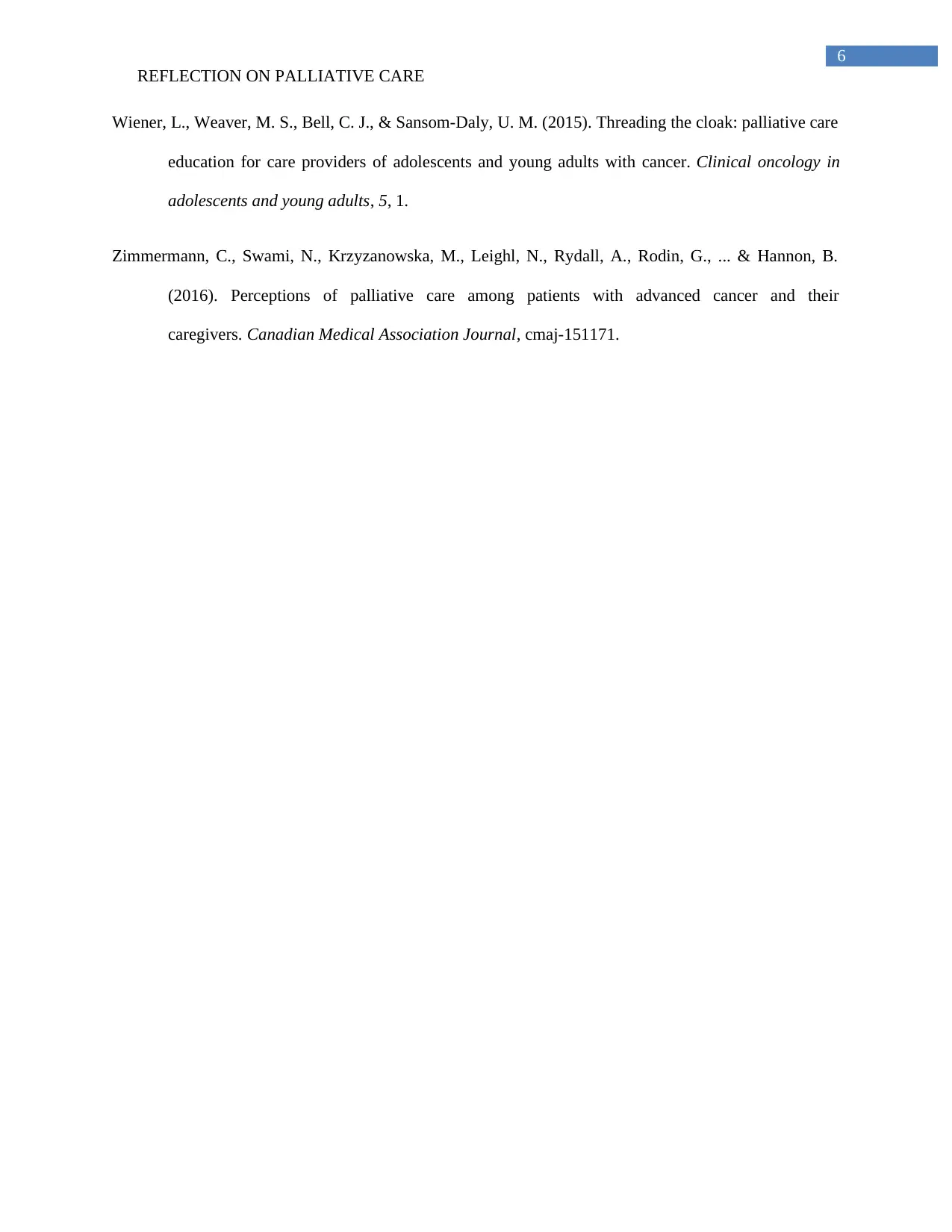
6
REFLECTION ON PALLIATIVE CARE
Wiener, L., Weaver, M. S., Bell, C. J., & Sansom-Daly, U. M. (2015). Threading the cloak: palliative care
education for care providers of adolescents and young adults with cancer. Clinical oncology in
adolescents and young adults, 5, 1.
Zimmermann, C., Swami, N., Krzyzanowska, M., Leighl, N., Rydall, A., Rodin, G., ... & Hannon, B.
(2016). Perceptions of palliative care among patients with advanced cancer and their
caregivers. Canadian Medical Association Journal, cmaj-151171.
REFLECTION ON PALLIATIVE CARE
Wiener, L., Weaver, M. S., Bell, C. J., & Sansom-Daly, U. M. (2015). Threading the cloak: palliative care
education for care providers of adolescents and young adults with cancer. Clinical oncology in
adolescents and young adults, 5, 1.
Zimmermann, C., Swami, N., Krzyzanowska, M., Leighl, N., Rydall, A., Rodin, G., ... & Hannon, B.
(2016). Perceptions of palliative care among patients with advanced cancer and their
caregivers. Canadian Medical Association Journal, cmaj-151171.
1 out of 7
Related Documents
Your All-in-One AI-Powered Toolkit for Academic Success.
+13062052269
info@desklib.com
Available 24*7 on WhatsApp / Email
![[object Object]](/_next/static/media/star-bottom.7253800d.svg)
Unlock your academic potential
Copyright © 2020–2026 A2Z Services. All Rights Reserved. Developed and managed by ZUCOL.




